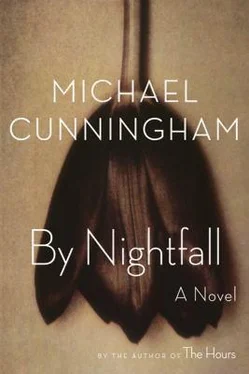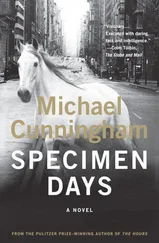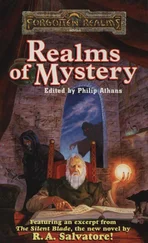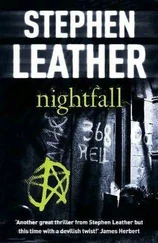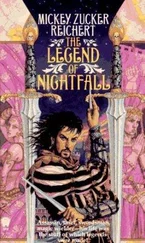Carole insists that Gus drive them back to the city, and Peter accepts gratefully, after the briefest show of false reluctance. He, Cowardly Peter, is eager to be relieved of the train ride back with Mizzy. What would they talk about?
Gus’s presence will enforce a silence that would be too uncomfortable on the train. Thank you, Carole and Gus.
And so he and Mizzy sit side by side in the backseat of the BMW, driving along the consoling normalcy of I-95, surrounded by other people in other cars, most of whom have, in all likelihood, never kissed their brothers-in-law.
Does Peter envy them, or pity them?
Both, really.
A fury rises up in him, quick as panic, fury at his thick-ankled daughter and his comradely, distant wife and Uta and Carole fucking Potter and everyone, everything, Gus’s faux-hawk and his little red Irish ears; everyone and everything except the lost boy sitting beside him, the only person with whom he actually should be angry, the boy who invited an impossible kiss (did he invite it?) and followed it with implausible flattery (that’s what it was, right?). There’s no telling how much of Mizzy is deceitful, how much deluded, and how much (God help you, Peter Harris) genuine. Because, all right, he wants it to be true, and it might, it might conceivably be true, that Mizzy has been mooning over him since Peter read Babar to him when he was four. Peter doesn’t think of himself, never has, as someone to be mooned over. Yes, he’s seductive and he’s decent-looking but he’s the guy, he’s always been the guy, looking up at the balcony from the garden below. He’s the servant of beauty, he’s not beauty itself, that’s Mizzy’s job, just as it once was Rebecca’s.
As it once was Rebecca’s.
The anger subsides as quickly as it announced itself, and in its place a sorrow wells up, a wave of gut sorrow, as he glances (unobtrusively, he hopes) at Mizzy’s solemn profile, his aristocratically hooked nose, the shock of dark hair that trembles on his pale forehead.
This is what Peter wants from art. Isn’t it? This soul sickness; this sense of himself in the presence of something gorgeous and evanescent, something (someone) that shines through the frailty of flesh, yes, like Manet’s whore-goddess, a beauty cleansed of sentimentality because Mizzy is (isn’t he?) a whore-god in his own way, he’d be less compelling if he were the benign, brilliant, spiritual entity he says he’d like to be.
Beauty—the beauty Peter craves—is this, then: a human bundle of accidental grace and doom and hope. Mizzy must have hope, he must, he wouldn’t shine like this if he were in true despair, and of course he’s young, who in this world despairs more exquisitely than the young, it’s something the old tend to forget. Here he is, Ethan aka the Mistake, shameless and wanton, addicted, unable to want whatever it is he believes he’s supposed to want. This would be the moment to do him in bronze, to try to capture the aching raw nerves of him, the all-but-unbearable final stages of his youth shimmer, as he begins to understand that his condition, like everybody’s, is serious, but before he begins to take the necessary steps to live semipeaceably in the actual world.
In the meantime, he needs not to die.
Gus drops them in front of the loft. Goodbyes and thank-yous. Gus motors off. Peter and Mizzy stand on the sidewalk together.
“Well,” Peter says.
Mizzy grins, a satyr now. Where did the damp-eyed, ardent version go?
He says, “Just act like nothing happened.”
“What did happen?”
“You tell me.”
Fuck you, man-child.
“We can’t have an affair.”
“I know that. You’re my sister’s husband.”
And how exactly, Mizzy, have you suddenly become the voice of rectitude?
“I like you,” Peter says. Lame, lame.
“I like you, too. Obviously.”
“Do you think you could tell me what you want? I mean, to the best of your ability.”
“I want to have kissed you on a beach. Don’t be so dramatic.”
Dramatic? Who’s the dramatic one here?
Peter says, “I don’t think I can pretend it was nothing.”
“Well, you don’t have to marry me, either.”
Youth. Heartless, cynical, despairing youth. It always wins, doesn’t it? We revere Manet, but we don’t see him naked in a painting. He’s the bearded guy behind the easel, paying homage.
“Well. Let’s go in, then.”
“After you.”
How did this happen? How can Peter be standing in front of his own building, wishing with all his might that Mizzy would protest his love one more time, so that Peter could scold him for it. Was he too abrupt back there on the Potters’ lawn? Did he miss some crucial chance?
Some chance for what, exactly?
Silly humans. Banging on a tub to make a bear dance when we would move the stars to pity.
They go in. Neither of them says anything more.
Rebecca is home already, in the kitchen, making dinner. Peter lives through a spasm of conviction that she knows what’s up, has gotten home early for a confrontation. Which is, of course, ridiculous. She comes to the door, wiping her hands on her jeans, kisses Mizzy on the cheek and Peter on the lips.
“I’m making a little pasta,” she says. To Mizzy she adds, “Remember, I’m not Mom. I have some sort of domestic aptitude.”
“Even Mom wasn’t exactly Mom,” says Mizzy.
“You boys pour yourselves a glass of wine,” Rebecca says, heading back to the kitchen. “It’ll be about twenty minutes or so.”
She is a vital, capable woman whose husband and brother have kissed on a beach. Not that Peter forgot. Still, there’s something about seeing her…
“I’ll get the wine,” Mizzy says. Normal normal normal.
“How’d it go in Greenwich?” Rebecca asks.
You have no idea how it went in Greenwich.
“Perfecto,” Peter says. Perfecto? Who is he now, all of a sudden, Dean Martin? He adds, “I’m sure she’s going to buy it. I just have to get Groff up there now to approve of her.”
“Great.”
Mizzy brings a glass of wine to Peter. As he hands him the glass, as their hands touch, does Mizzy slip him a look? No. The horror of it is, he doesn’t.
Rebecca picks up her half-empty glass from the countertop. “To selling art,” she says. And for a moment Peter thinks she’s being ironic.
He raises his glass. “To paying next semester’s tuition,” he says.
“If she ever goes back to school,” Rebecca answers.
“Of course she’ll go back. Trust me. There’s nothing like slinging drinks for drunks to make college look good again.”
Normal normal normal.
Rebecca has planned an evening in. She’s not only made dinner, she’s rented a copy of 8½. It’s a simple gesture, simple enough, though Peter knows she’s also embarking on a campaign to seduce Mizzy into the ordinary comforts. He knows, too, that she feels guilty about some largely imaginary neglect she’s meted out the last couple of days, having had her mind on the sale of the magazine.
They perform, all three of them, what Peter can only call a gorgeous imitation of the regular. Over dinner they talk about selling things (art, magazines). Mizzy does (a newly revealed talent) a spot-on imitation of Carole Potter—he gets her pneumatic little head-nods, the liquid avidity of her eyes, even the undercurrent of mmm sounds she makes as she listens, or appears to listen. This is a mild revelation to Peter—Mizzy is not as absorbed by full-time Mizzyness as one might think. It seems (romantic delusion?) to speak to Mizzy’s capacity for truth-telling—when he says, oh, for instance, that he’s loved Peter all his life, it’s possible that he means it. Vain Peter, you’ve always been the pursuer, how strange and wonderful it would be if you were for once in your life the pursued. Then Rebecca speculates about what sort of Big Art Thing might be engendered in Billings, Montana, to which Mizzy and Peter, suddenly a boy gang, offer only mocking suggestions: feeding poets to bears in the football stadium, commissioning ice sculptures—they’re not particularly good jokes but that isn’t the point, it’s boys versus girl, which Rebecca takes in stride, knowing, as she surely does, that she can have it out with Peter later, in bed.
Читать дальше
Конец ознакомительного отрывка
Купить книгу
